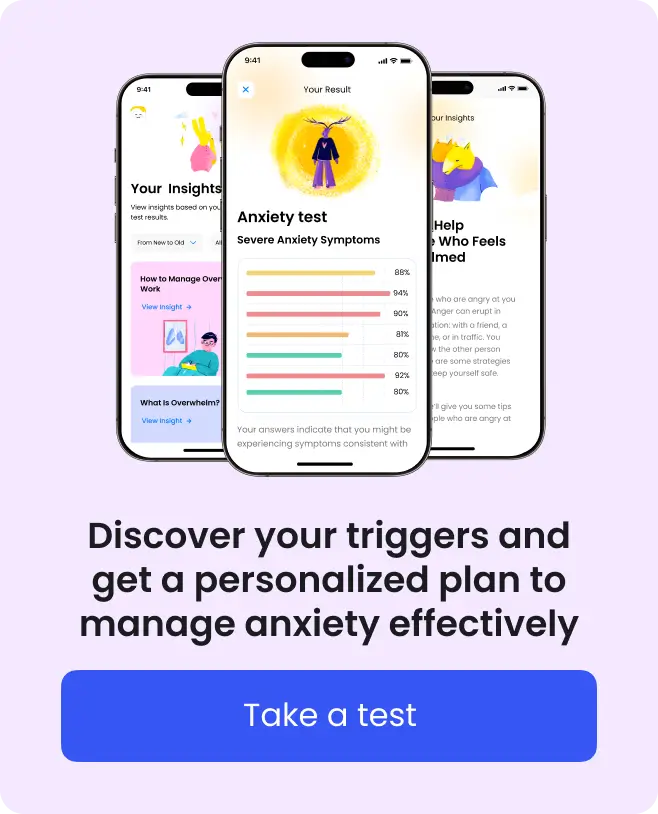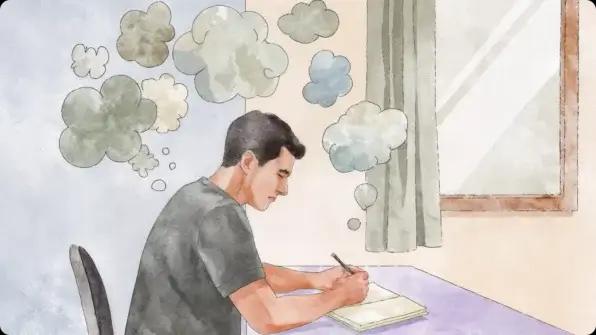You wake up at night and think about work reports; take a coffee break, and feel stressed about tomorrow’s meeting; spend time with your family, and worry about inflation or something happening on the other corner of the globe.
If you’ve ever caught yourself constantly overthinking, feeling drained, and missing out on life’s simple joys, it’s time for a change. Keep reading to discover how to stop worrying about everything.
How to stop worrying — understanding your emotions is the first step toward better mental health
Before discovering practical tips for getting rid of chronic worry, let’s learn some theory about this emotional process.
What is worrying?
The American Psychological Association defines worrying as ‘a state of mental distress or agitation due to concern about an impending or anticipated event, threat, or danger.’ Simply put, it means feeling stressed while thinking about what might go wrong in the future. This mental habit may create a worry cycle where the more we imagine worst-case scenarios, the more anxious and overwhelmed we become.
Scientists state that about 4.05% of the global population has an anxiety disorder. Yet, there are many more people who live with everyday worries but don’t meet the criteria for a clinical diagnosis.
Why do we worry about things we can’t control
Thousands of years ago, when our ancestors felt in danger, their bodies released hormones that helped them either run or fight. This turned on the emergency systems in their bodies.
In the age of constant physical threats, it was reasonable to mobilize energy and resources. Worrying and feeling nervous meant that the danger was close and people needed to be ready in order to survive. Stress was a signal that helped them deal with challenges and adapt to an unfriendly environment.
But now, the threats are different. Instead of wild animals, we face work deadlines, social pressure, and information overload. We can’t fight, and running away isn’t always the way out.
Yet, our amygdala (an ancient part of the brain responsible for triggering the “fight-or-flight” response) evolved long before the prefrontal cortex, which controls reasoning and self-regulation. As such, our bodies react automatically and release stress hormones even when there are no real threats.
Thus, worrying, instead of helping us, can turn into a repeating cycle. So, now we need to find new ways to handle stress and regulate our nervous system.
How to stop worrying about things you can’t control
We live in stress, and more stress factors appear every day. However, we aren’t supposed to be in the “fight or flight” state as often as we are in 2025. Save these simple tips to decrease chronic worrying and avoid panic attacks.
Differentiate controllable vs. uncontrollable situations
Life is full of situations that you can and cannot control. While having solvable worries and taking actions right away might be reasonable, dwelling on uncontrollable ones only drains your energy.
Thus, the first thing to do when you start experiencing a little worry is to analyze whether you can influence a specific situation. If the answer is ‘no,’ use these tips. If you can change something, proceed to the tips in the next sections.
Schedule a daily “worry time”
Find a few moments and allow yourself to dwell on anxious thoughts for 15-20 minutes daily. Say to yourself, “Not now, I’ll deal with you at 4 PM.” By acknowledging your concerns at a specific worry time, you might find that your mind stops feeling so overwhelmed throughout the day.
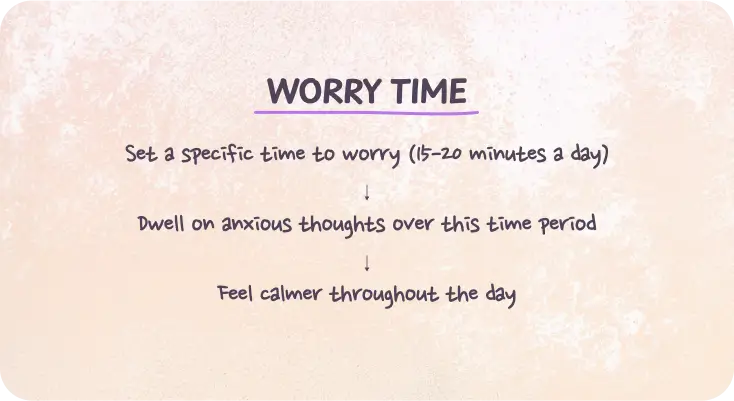
Practice acceptance & letting go
Chronic worrying about economic shifts, political changes, someone’s actions, or even the weather makes little sense. Yet, if you feel stressed about things you can’t fix at all, answer the questions below:
- Is it a real problem that influences you right now or just a “what-if”?
- If it’s a “what-if,” how likely is it to happen?
- If it’s a real problem, how can you reduce its influence?
If the uncertainty is still here, you’ll need to accept negative thoughts and simply observe. Maintaining a positive mindset and adapting to whatever comes your way is the best strategy.
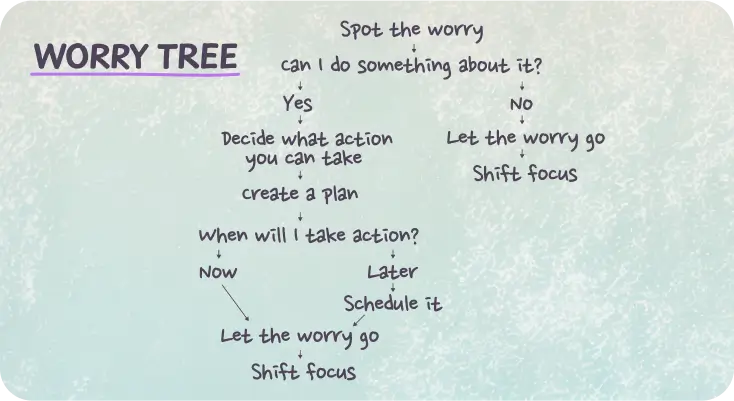
How to stop anxious thoughts about something specific
There can also be situations when you need to find solutions, fix mistakes, and directly influence the outcomes. In this case, you can avoid the worry cycle by taking proactive steps and analyzing your reactions. Think about the following:
Ask, “Is this useful?” and challenge worrying thoughts
A helpful tip on how to stop worrying is to question whether your thoughts help you solve the problem or just keep you stuck in anxiety. You’ll probably come up with the idea that they are rather unhelpful. In this case, you can begin by asking yourself:
- Is this thought based on facts or fears? Look at the evidence. Think about whether you’re jumping to conclusions or if there is real proof for your worries.
- What’s the worst possible outcome? Analyze the worst-case scenario to see if it’s truly likely.
- What’s a more positive way to handle it? Avoid thinking, “I’m going to fail this presentation,” and try, “I’ve prepared well and will do my best.”
Understand the difference between problem-solving vs. overthinking
Planning, predicting in advance, and assessing the situation might be really helpful to stop worrying. It’s better to differentiate a thoughtful approach to various situations from overthinking.
Set realistic goals
Unrealistic goals and sky-high expectations can lead to worrying about why you can’t achieve everything at once. If you’re likely to put too much pressure on yourself, it will be helpful to:
- Prioritize 1-2 main tasks a day and work on them
- Break down your goals into small steps and set clear deadlines
- Track your progress to understand what makes you feel frustrated
- Reach out for help if you feel the need
- Celebrate each victory
- Feel free to adjust your plans when something goes wrong
Take things under control
When life is full of challenges, you have nothing left but to keep worrying or thinking about something bad. Try to focus on and fix things you can control, and you’ll feel much better. It might be something simple:
- Organize your workspace
- Set a goal for a week (for example, to build a new healthy habit)
- Plan your weekend
- Clean your room
List your worries and follow the 5×5 rule for managing stress
Now, let’s think about things you can’t organize on the spot. As much as you might want it, it’s just not possible to predict any possible roadblocks, especially when you’re not the only one making the decisions. Here’s how to get rid of anxiety in this case:
- Identify the problem
- Think about how important it will be in 5 years
- If it won’t, set a 5-minute time limit to worry and then let the situation go
- After this time, shift your attention to something completely different
- If the problem matters, pay attention to fix it instead of just overthinking it
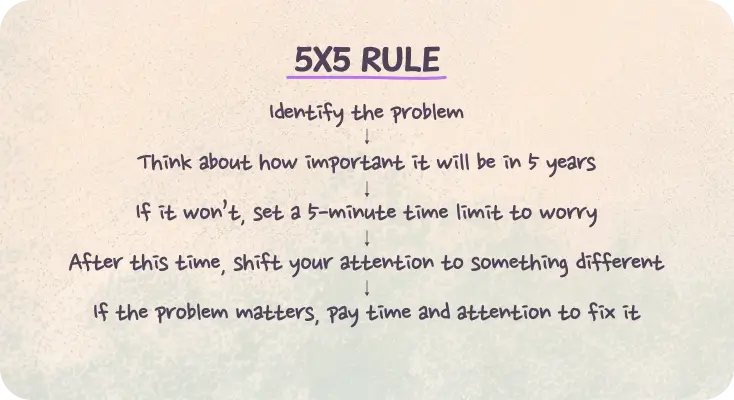
Face your fears head-on
In some cases, you need to meet your fears and understand that they aren’t as scary as you imagined. This is most common for situations that might cause social anxiety:
- Public speaking
- Job interviews
- Meeting new people
- Asking for help
If anxiety holds you back and you can’t cope on your own, don’t hesitate to get help from a professional.
How to not worry so much? 4 Techniques to manage stress in daily life
If you live with a worry habit and experience stress reactions on a daily basis, it can also be a great idea to implement new grounding habits. Here are some practices to break free from negative thought patterns and feel calmer, whatever happens around.
1. Try journaling when feeling anxious
To avoid chronic anxiety, you can keep a journal about everyday life challenges and the way you handle them. The Breeeze app has advanced journal prompts that allow users to answer questions about what they feel, analyze patterns, and, this way, stop worrying. We’ve talked to Ann, an experienced user of the app, on how this feature helps her handle stress and anxiety.
“I used to be a very anxious person. Every time something in my life went wrong, I started to worry excessively and imagine the worst scenarios. So, I was looking for something to help me release what I feel and see the situation from a different angle.
I first started using Breeze for their self-discovery tests, but eventually decided to try journaling as well. It was exactly what I’d been searching for! Writing down my thoughts helped me understand my emotions better. Now I use this feature regularly to handle stress and anxiety.”
2. Turn to mindfulness & meditation to reduce stress
Meditation and mindfulness help you stay focused and calm the buzz of thoughts inside your head. If you don’t like sitting in a lotus pose and following someone’s voice, that’s fine. You can find a vast number of practices on the Internet. Start from the guide on how to meditate and proceed to the practices below.
Use body scan meditation
Chronic worrying may lead to physical symptoms, including fatigue, metabolic disorders (e.g., diabetes, obesity), depression, and immune disorders. To avoid them, try this simple emotional well-being practice:
- Sit comfortably and close your eyes
- Focus on your breathing and take a few minutes just to observe
- Start observing physical sensations: begin with your toes and slowly move upward to other muscle groups
- As you focus on each area, notice any discomfort and imagine how you release it
This practice is a bit similar to progressive muscle relaxation, but instead of tensing and relaxing your muscles, you just notice the tension and let it go.
Do a box deep breathing exercise
This simple breathing exercise may easily become a part of your everyday life. Turn to it whenever you are feeling worried, as you can do it anywhere: at work, during important events, and even on long trips.
- Sit or lie down comfortably
- Take a deep breath and slowly count to 5
- Hold your breath for a count of 5
- Exhale through your mouth for another 5 seconds
- Repeat for several minutes
This relaxation technique may serve as a simple meditation if you focus on the sensations in your body during the exercise. It helps clear your mind and feel more grounded during a stressful day.
Try the 333 rule for anxiety
The 333 rule for anxiety is a simple mindfulness technique you can use during tense moments. Everything you need is to:
- Name 3 things you see
- Name 3 sounds you hear
- Move 3 parts of your body
Do you tend to worry about everything?
3. Practice gratitude
Sometimes, thinking about positive things in your life might be like shining a flashlight in a dark room. You may uncover corners of your life filled with unexpected brightness.
Praise small achievements
Notice the slightest changes in your mental or physical state and celebrate them. With the Breeze’s mood tracker, you can turn this into a habit. Note your wins, however tiny, and watch how focusing on these positive moments helps you shift your mindset and stop worrying.
Use positive affirmations
This step can help rewire your brain and get more self-confident, peaceful, and grateful as well. Here are a few examples of great affirmations:
- “I’m strong and can face any situation.”
- “I focus on what I can do.”
- “I deserve a life filled with peace and joy.”
- “Challenges make me more resilient.”
- “I love myself and the people around.”
If you worry too much about what others think about you and want to improve self-esteem, reading these self-love quotes might be rather helpful.
4. Follow the 21-day well-being plan from Breeze
Start by taking a quick, free test to uncover what’s really going on. This will help you unlock the door to your inner world and get personalized insights about your well-being.
But the Breeze test won’t just tell you where you’re at — you’ll receive recommendations on managing worries. Over the next 21 days, you can take a significant step toward a more fulfilled life without anxiety.
Empower this plan by tracking your mood and following routines in the Breeze app. It’s like having a personal wellness coach in your pocket who helps you swap stress for calmness and happiness.
Lifestyle strategies for deeper change
Scientists have proven that lifestyles may also impact the biological systems involved in stress response. As such, if you don’t want to become a chronic worrier and feel the need to take care of your mental health, add these self-care habits to your daily routine.
Improve your sleep, nutrition, and training schedule
To reduce the number of negative thoughts in your daily life, review your schedule. Stability and regularity give you a sense of control and positively influence the body’s stress mechanisms.
Get enough sleep and revise your sleeping habits
“Why do I wake up tired?” If this is a question you ask yourself every morning, it’s time to ring the alarm bells. Constant worries and losing sleep are connected like two Oreo cookies. There are several hacks on how to improve your sleep and stop anxious thoughts:
- Choose blackout curtains and a sleep mask
- Choose a comfy mattress and pillow
- Minimize noise
- Keep a sleep schedule
Look at your plate
Sugar and processed food may increase anxiety symptoms and can make you start worrying too much. Instead, focus on adding whole, nutritious foods to your diet. Fresh fruits, vegetables, and whole grains can boost your mood and keep your energy steady.
Cut down on coffee and alcohol
Sometimes, we all need “doping” to get more energetic or, vice versa, to relax. But when it comes to exaggerated worry, remember how many cups of coffee or glasses of wine you drank over the last week.
Caffeine and alcohol impact our central nervous system. They change the levels of dopamine and serotonin in our bodies. As a result, our blood pressure rises, and we feel our heart racing, which worsens anxiety. Thus, it’s better to drink water or herbal tea, as they’ll make you feel much better.
Stay in motion
Sport shouldn’t be a forced necessity; it can bring enjoyment and mental stability to your life. Here are some tips to start enjoying sports and calm your worry thoughts down:
- Try different physical activities. Going to the gym isn’t the only fitness activity in the world. Try Kangoo Jumps, yoga, running, or dancing. Keep going until you find a kind of exercise that you enjoy doing.
- Don’t force yourself. A famous football player, Mike Singletary, once said, “Do you know what my favorite part of the game is? The opportunity to play.” Enjoy the process instead of simply working for the results.
- Understand your goal. Remember why you’re exercising — it’s a key to how to worry less.
Support social connections
It can be much easier to stop worrying when trustworthy people are around. You can always share your thoughts, gain new perspectives, and feel that you’re not alone.
Ask your friends and family members for support
What is love? It’s support and dedication. When you worry about yourself and everything around you, share these feelings with your loved ones. They may give great advice or provide a shoulder to cry on, which is priceless.
Strengthen social relations
Sometimes, we have the most perfect friends and family, but still experience a lack of socialization. Maybe your loved ones are far away, or maybe your social battery is never running low, and you just need more.
In this case, connect with those around you. Whether it’s a quick chat with a coworker, catching up with an old friend, or even joining a local football club, engaging with others can provide emotional support.
Limit rumination and set limits for negative thinking
Sometimes, our anxious thoughts might stem from constantly replaying the same thoughts, emotions, and even behavioral patterns. Here’s how to replace rumination with more effective ways to process emotions.
Lower your screen time
Think about the last time you scrolled TikTok for hours and then started worrying about things you can’t control. Probably, there were dozens of such cases.
To break the cycle, it’s better to set a specific time for checking your socials and take regular breaks to reconnect with the real world. Consider replacing screen time with activities that make you happier, like going for a walk or spending time with loved ones.
Free up your emotions
If you’ve ever felt like your anxiety gets out of control, letting your feelings out can be a powerful strategy. When you cry or get angry, you give yourself a break from the worry loop. So next time you’re overwhelmed, it might be better to free up your feelings and give yourself a chance to breathe easier.
FAQ
Can you stop worrying completely?
Here’s what Cimone Hanif, PhD, TLLP, states, “Excessive worrying can have many detrimental effects in your day-to-day life — so it is important to manage it appropriately! It’s important to note that managing your worries does not mean completely eliminating all concerns or stresses from your life. It involves developing healthy coping strategies and adopting a more balanced perspective. If excessive worrying persists and significantly interferes with your daily functioning, it’s advisable to seek professional help from a mental health provider.”
What are the risk factors for chronic worrying?
- Childhood trauma. If you witnessed or experienced traumatic events in childhood, worries can follow you for the rest of your life. Start from our article on how to work through childhood trauma to deal with it. You may need a therapist’s help as well.
- Drugs or alcohol. They activate the brain’s reward system, which releases dopamine, and you feel happier using them. However, over time, your body becomes unable to release dopamine on its own, and you get more anxious.
- Sleep or nutrition problems. I’ll focus on them in the next paragraph. Besides, you need to know that poor nutrition, impaired quality of sleep, and coffee addiction can turn you into an anxious mashed potato quite quickly.
What disorders cause excessive worrying?
Nevertheless, maybe you can’t stop worrying because of severe health disorders. You can read them in detail in the article on how to tell if nausea is from anxiety. But let’s enlist them briefly here.
- Phobias
- Panic Disorder
- Generalized Anxiety Disorder (GAD)
- Social Anxiety Disorder
- Post-Traumatic Stress Disorder (PTSD)
Don’t try to diagnose yourself. If you have any mental health concerns, please talk to your healthcare provider.
What to do if techniques don’t work?
If you don’t know how to calm your anxiety, and none of the hacks seem to work, reach out to a professional. In 2023, around 13% of US adults were being treated by psychologists or other mental health professionals. And, often, it is the best option.
Sources
- Javaid, Syed & Hashim, Ibrahim & Hashim, Muhammad & Samad, Mohammed & Ahbabi, Alia. (2023). “Epidemiology of anxiety disorders: global burden and sociodemographic associations. Middle East Current Psychiatry.”
- Dhabhar FS. “The short-term stress response – Mother nature’s mechanism for enhancing protection and performance under conditions of threat, challenge, and opportunity.” Front Neuroendocrinol. 2018
- American Psychological Association. “Stress effects on the body.” 2018
- Mandelli L, Milaneschi Y, Hiles S, Serretti A, Penninx BW. “Unhealthy lifestyle impacts on biological systems involved in stress response: hypothalamic-pituitary-adrenal axis, inflammation and autonomous nervous system.” Int Clin Psychopharmacol. 2023 May
- Statista. “Percentage of adults in the United States who had ever received treatment or therapy from a psychologist or other mental health professional from 2023 to 2024”
Disclaimer
This article is for general informative and self-discovery purposes only. It should not replace expert guidance from professionals.
Any action you take in response to the information in this article, whether directly or indirectly, is solely your responsibility and is done at your own risk. Breeze content team and its mental health experts disclaim any liability, loss, or risk, personal, professional, or otherwise, which may result from the use and/or application of any content.
Always consult your doctor or other certified health practitioner with any medical questions or concerns
Breeze articles exclusively cite trusted sources, such as academic research institutions and medical associations, including research and studies from PubMed, ResearchGate, or similar databases. Examine our subject-matter editors and editorial process to see how we verify facts and maintain the accuracy, reliability, and trustworthiness of our material.
Was this article helpful?


